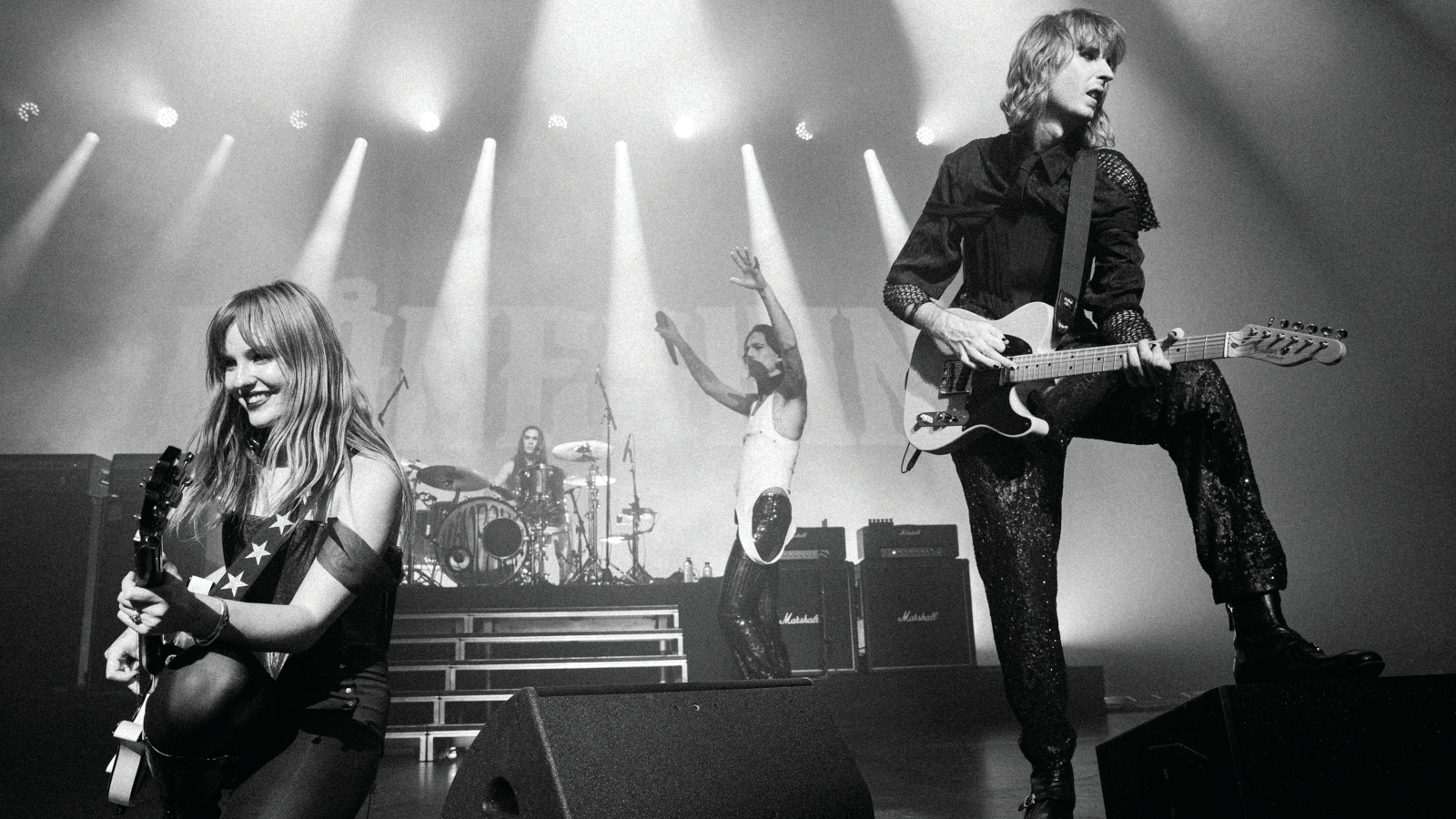
Some bands just have that magical, elusive “it” factor. Take Italy’s Måneskin. From the minute the Rome-based group appeared on the popular Eurovision Song Contest in 2021 and tore the stage apart with their riffy, rap-rock knockout “Zitti e Buoni,” audiences embraced this dynamic, unapologetically provocative and unbelievably charismatic foursome as the genuine article. Lead singer Damiano David prowled the stage like a feral jungle cat, and guitarist Thomas Raggi tossed out fireball shrieks, snaggletooth rhythms and blasts of sinuous leads, all while bassist Victoria De Angelis and drummer Ethan Torchio attacked their instruments with fury.
And just as quickly, and just as predictably, writers seized on Måneskin – pronounced MOAN-eh-skin (it means midnight in Danish) – and anointed them the new “saviors of rock ‘n’ roll.” It’s a heavy cross to bear, but from all appearances, the band seems to be taking it all in stride.
“The idea of ‘saving rock’ is a pretty big goal to put on ourselves,” De Angelis says. “We really try not to think about that kind of thing. To us, rock music is a vehicle to express ourselves and to have fun – I think it’s always been that. And that’s what we do. We have a really good time when we play. I think the biggest thing we have going is, we try not to fit inside any kind of current mainstream format, because then we would be inauthentic. It would be fake.”
Raggi agrees, but he also suggests Måneskin could have a more significant and lasting impact on their young fans. “It’s not lost on us that a lot of people our age aren’t playing instruments like they used to,” he says. “If we can inspire them to play real instruments, that would be great. Maybe they see us on TV or onstage, jumping around and having fun playing our instruments, and they might think, Hey, I want to do that. I want to buy a guitar. I want to play bass. I think that’s important.”
De Angelis quickly picks up on that thought. “I think it’s already happening,” she offers. “I see these videos of kids playing covers of our songs, and they’ll have the exact same bass that I play or the same guitar that Thomas uses.”
Måneskin are an ambitious lot, and thus far, all of their moves are paying off in dividends. They scored a worldwide hit with the raunchy ripper “I Wanna Be Your Slave,” and their super-charged cover of the Four Seasons’ “Beggin’” was an unlikely smash, dominating airwaves – particularly in the U.S. – in 2022. As a live outfit, they’ve stolen the show at festivals like Lollapalooza and Coachella, slam-dunked appearances on Saturday Night Live and other late-night TV shows, and in perhaps one of the true tests for any band, they proved that they could win over a Rolling Stones stadium crowd.
The group’s recently released third album, Rush! (Epic), looks poised to propel their fame to even greater heights. With the exception of three tracks, the songs are sung in English, and there’s not a piker to be found among the 17 cuts.
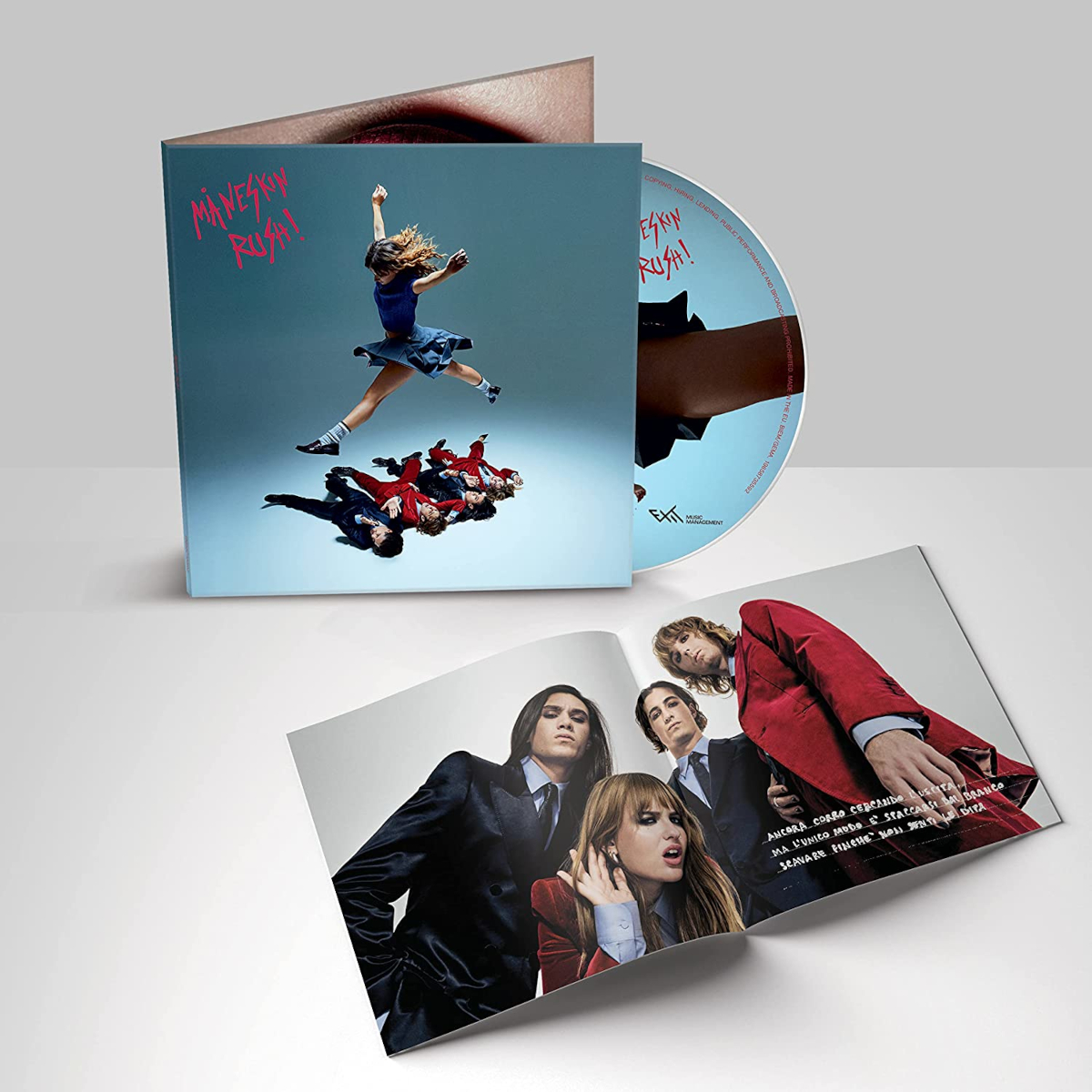
Growing musically while under the white-hot spotlights of sudden celebrity is a tough operation, but Måneskin have pulled it off. Hook-filled arena stompers like “Baby Said” and “Gasoline” roar with guitar crunch, and even a big-time power ballad like “Timezone” delivers poignancy with nary an ounce of treacle.
As a soloist, Raggi plays to the song, filling spaces with economical but effective bursts of shred, but on the dramatic album closer “The Loneliest” he stretches out for a squealing and screaming lead. For added guitar goodness, none other than Tom Morello turns up on the bruising single “Gossip” for not one but two solos.
For a while we wrote two songs a day. We didn’t want to close the door on any ideas
Victoria De Angelis
Going into the recording of Rush!, Måneskin knew they had to come up with a winner, and to that end they enlisted Swedish hooks god Max Martin (known for his work with non-rockers Britney Spears and Taylor Swift, among others) to pump up the ear-candy factor without defanging any of the punch. All in all, the band wrote some 50 songs during a three-month period late last year before whacking them down to a manageable bunch.
“It was crazy,” De Angelis says. “For a while we wrote two songs a day. We didn’t want to close the door on any ideas, so we just said, ‘We’ll keep writing, and at the end of these three months we’ll look at what we’ve got.’ The selection process was difficult because we’re four people with different tastes, but I also think that our differences gave us a more interesting record.”
Adds Raggi, “In the end, we acted very democratically. Each member got to choose a group of songs, so we all feel equally represented. I think the album is a really good representation of who we are and what we’re all about.”
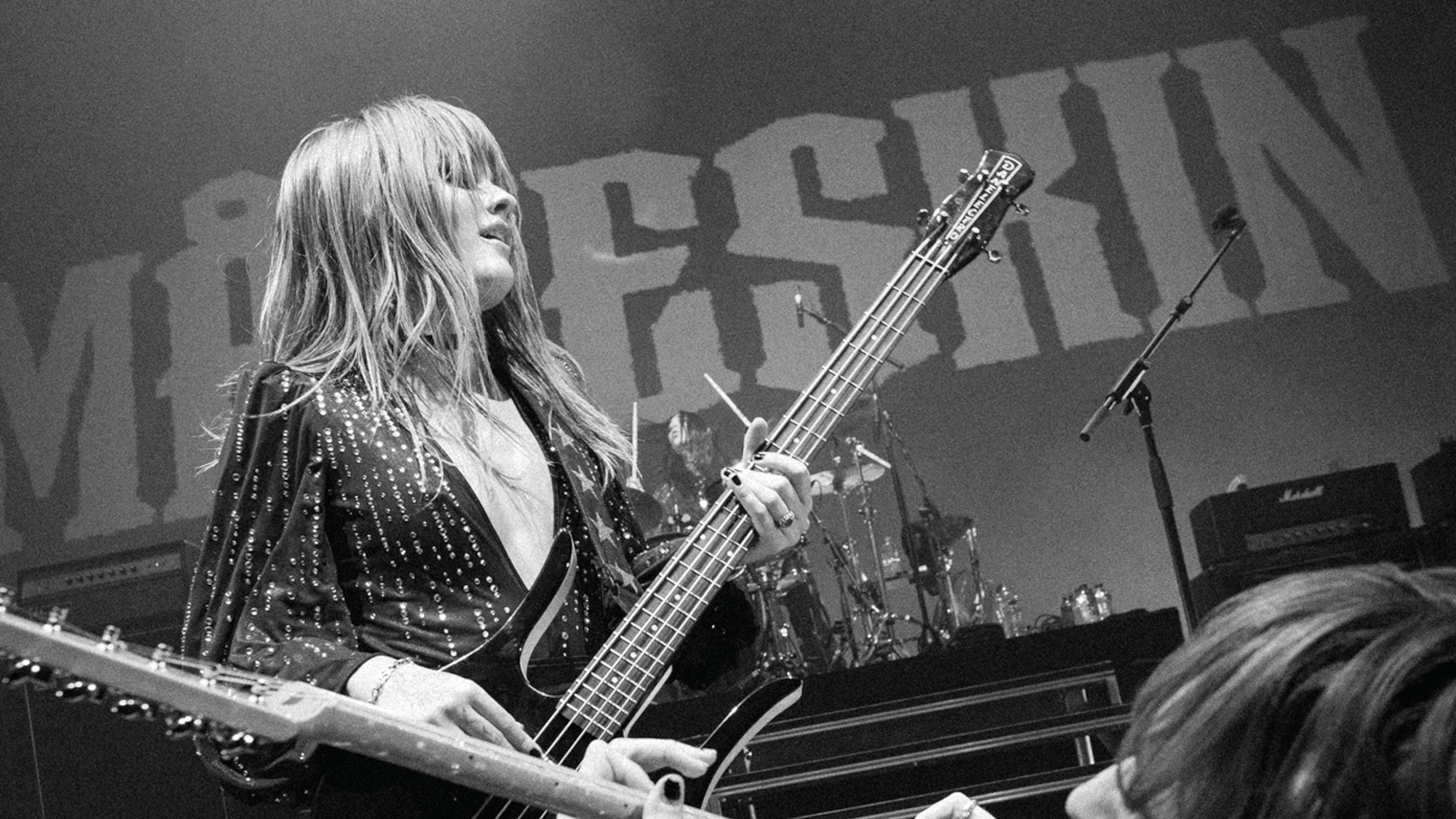
You guys seem to be doing everything right. None of this is by accident, of course – there’s got to be some kind of plan to it. How do you and your manager devise a strategy?
VICTORIA DE ANGELIS There’s a plan to it, yes, but we try to be guided by the music. Sure, we sit down and look at the places we’re playing and the opportunities we have, but nothing happens without the music.
THOMAS RAGGI That’s how it really started. When we won the Eurovision Song Contest, we stuck out because we played rock music. It’s the genre that we like, and that’s the choice we made. When we started out, we played more soul and reggae stuff, more pop songs, but we love to rock out.
You’re playing bigger and bigger places. Have the changes in venue size affected your musicianship?
DE ANGELIS We haven’t really been able to think about it. Of course, when we’re playing bigger places, we have to try to reach people who are far away, but I still feel like I did when we were playing the clubs. I want to get down with the crowd. [laughs] That’s harder to do when there’s 15,000 people, but we try not to let the musicianship suffer, even though we have to put on a bigger show now.
When we won the Eurovision Song Contest, we stuck out because we played rock music
Thomas Raggi
Do you find it harder to get your sound on bigger stages?
DE ANGELIS With bigger places, there can be more echo inside the venue. If a stage is bigger, you might move around more and you don’t hear yourself like if you were in a smaller club.
RAGGI Sometimes it’s hard to get the sound you like, but we do our best. As a guitarist, I have to be aware of where my pedals are set up. If I move around too much, I have to make sure I can get back to the pedals at the right time in a song. It’s something I’m getting used to.
Tom Morello has made it known online how much he loves your band. What was it like working with him on the track “Gossip”?
RAGGI It was sick, man. He’s so cool and super sweet. He came in and jammed with us, and that was awesome. You know, we grew up hearing him and Rage, so when he came in there was a bit of nervousness – “What’s he going to be like?” But he couldn’t have been nicer. Watching him play, the way he gets his sounds... It was wild.
DE ANGELIS What was really great was doing it with him in person. A lot of times, your label might say, “You should have this person or that person on your song,” but you don’t even get to meet them. They might send a verse over on a file or something. That’s bullshit, you know? Two artists collaborating should be genuine, and you can only get that when you’re together. Working with Tom was refreshing. He had the same approach as us – “Let’s jam!”
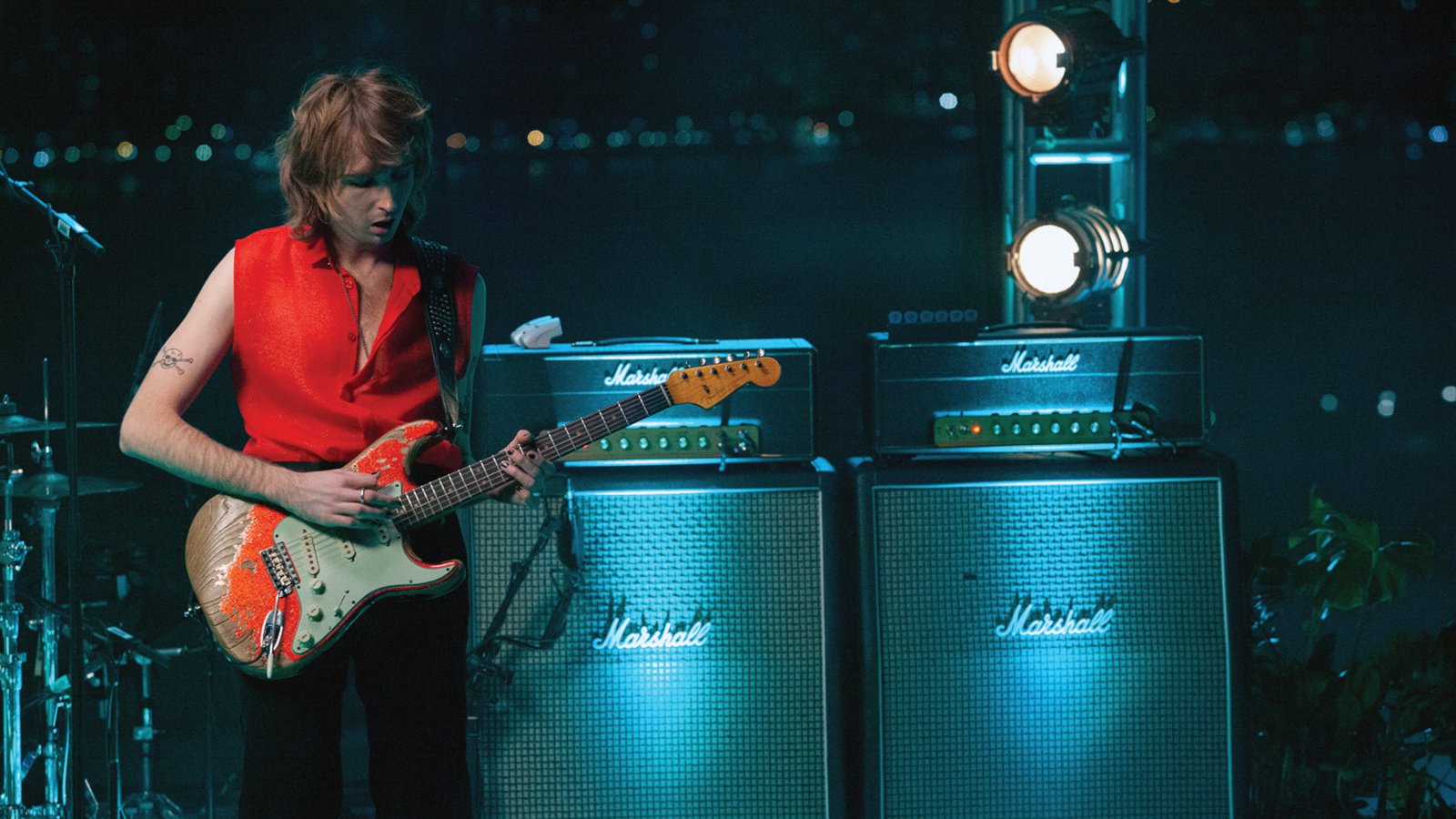
Thomas, you’ve talked about how much John Frusciante has influenced you. On the song “Timezone,” you play a slippery, arpeggiated intro that almost sounds like you’re channeling him.
RAGGI Oh, absolutely. Whenever I play clean arpeggios, I think I’m taking inspiration from John Frusciante. The way he mixes arpeggios and little lead parts is incredible. There’s always something new happening each time he starts the phrase over. He’s the best at that. He’s always been one of my top guys, for sure.
Speaking of intros, a number of your songs begin with bass lines. Also, a number of cuts have sections where the rest of the band drops out except for the bass.
DE ANGELIS A lot of times when we’re writing songs, it’s either me or Thomas coming up with a riff. We don’t have any rules like, “It’s got to start with guitar,” so there are certain songs, like “Gasoline” or “Mammamia” or “Baby Said,” that start out with the bass. We’ve only got two melodic instruments, so we try to mix it up. Sometimes we leave one out and then the other comes in, or maybe we harmonize.
It sounds live because it is. That’s how we write. We don’t sit around and write on computers
Victoria De Angelis
RAGGI Sometimes we’ll have a bridge where I’ll just vamp on some chords, and Victoria will play a lead line on the bass. If it sounds good, we’ll do it – whatever works.
Thomas, do you have any particular approach to solos, other than keeping them short and powerful?
RAGGI To be honest, I try not to analyze solos too much before I play them. Generally, I go by instinct. I’ll just start jamming, and I might play 30 minutes of leads for a song, and then we’ll pick the best parts. Or maybe we’ll pick little bits of what I’ve played and do a mash-up of sections. There was one song, though, “Mark Chapman,” where I played a more composed solo. I played it one or two times and was like, “That’s the part!”
The album is beautifully produced, but everything feels like a live band. I assume that was the idea.
DE ANGELIS Oh, it was. It sounds live because it is. That’s how we write. We don’t sit around and write on computers. We don’t want to be one of those bands that’s good in the studio, but then when you see us live, it’s like, “Oh, what happened?” Sure, we add bits of production, another guitar here and there, but we like to keep it real.

Thomas, you use a Squier Strat quite a lot. Guitar companies are going to throw a lot of instruments at you now.
RAGGI Oh, I love the Squier. Now I have a lot of cool Strats, but the Squier is still my main guitar. I grew up with it, so I always use it.
DE ANGELIS Now you use more Strats.
RAGGI No, not really. Actually, I’ve discovered Telecasters and they’re kind of a new avenue for me. They’re great. On the song “Kool Kids,” I used a Tele for the riff, and it’s super sick.
Victoria, how about you? Are you still playing the Danelectro Longhorn bass?
DE ANGELIS Always! [laughs] I love the feel and the tone of it. It’s very unique. No way am I going to change. That bass is me.
“Mark Chapman” is one of the songs sung in Italian, but obviously we all know that name. What’s the story behind it?
DE ANGELIS We felt like the media tends to glamorize killers and other bad people – almost like they’re cool or something. We wanted to portray things the way they really are. Also, musically, we wanted it to seem almost as if you were being followed. It has a sense of anxiety. It’s probably the fastest song we’ve ever written. And the solo is very… I don’t know how to say it in English.
I have a lot of cool Strats, but the Squier is still my main guitar. I grew up with it, so I always use it
Thomas Raggi
RAGGI It’s very noisy?
DE ANGELIS Noisy! You get the feeling like something is wrong.
I think it’s interesting that you tackled such subject matter. You guys are very young and weren’t even born when John Lennon was murdered. What do John Lennon and the Beatles mean to you?
DE ANGELIS Yes, we’re young, but as musicians we understand what the Beatles did. They made some of the biggest changes music has ever seen. They changed the whole culture. If it weren’t for them, we probably wouldn’t do what we do. What we play is very different from them, but we’re inspired by them. They’re fucking icons, and I admire them so much.
RAGGI They showed that you could make songs in pretty much any style. It’s like, whatever you want to write, you can do it because the Beatles did it.
“The Loneliest” is a really affecting rock ballad, and Thomas, you pulled off something of an epic solo. You do lay into the Whammy pedal on that one. Was that a little Tom Morello influence?
RAGGI [laughs] Oh yeah, of course. I had fun experimenting with some new sounds with pedals on that one. I used a Whammy on that one, and I worked out the solo in no time at all. I think I had it down in five minutes. It was a natural. There’s some parts on the record where I got these Leslie sounds. I love doing all that stuff.
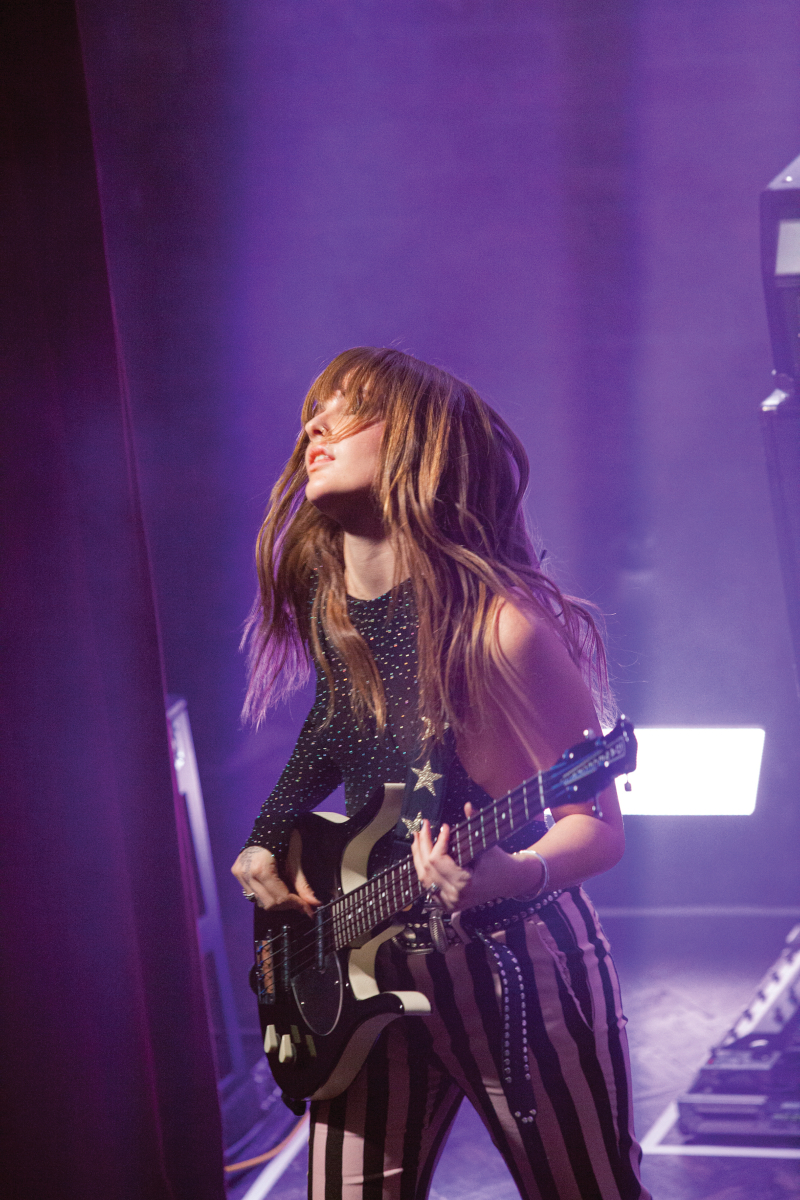
With success, your world is spinning very quickly now. You’re working at a very fast clip. How do you take care of yourselves mentally and physically to avoid burn-out?
DE ANGELIS For us, playing together is it. We can never play enough. Even when we’re on tour, we don’t feel stress because we enjoy the music so much. Whatever else is going on, when we get onstage, it all disappears in five minutes. The energy we get from the crowds cheers us up and keeps us going. There can be a bit of a routine now that this is our job – we have to be this place and that – but at the same time we try to remember how fortunate we are.
Finally, let me ask you, what about your musicianship would you like to improve? Is there anything in particular you want to work on?
DE ANGELIS Hmm… I think I want to come up with parts that work in more interesting ways with the guitar. I don’t necessarily want to follow what Thomas is doing; I want different layers, more counterpoints.
RAGGI If I have a goal, I’d say it’s to find something that’s mine, some cool stuff that the minute you hear it, you go, “Oh, yeah, that’s Thomas.” Like with Tom Morello, the way he works with the cable or the kill switch, or the way he uses a Whammy pedal – he’s iconic with all of that. I’d like to find more of my own thing, but it has to fit with the music, always.
Get The Pick Newsletter
All the latest guitar news, interviews, lessons, reviews, deals and more, direct to your inbox!

Joe is a freelance journalist who has, over the past few decades, interviewed hundreds of guitarists for Guitar World, Guitar Player, MusicRadar and Classic Rock. He is also a former editor of Guitar World, contributing writer for Guitar Aficionado and VP of A&R for Island Records. He’s an enthusiastic guitarist, but he’s nowhere near the likes of the people he interviews. Surprisingly, his skills are more suited to the drums. If you need a drummer for your Beatles tribute band, look him up.
“We’re Liverpool boys, and they say Liverpool is the capital of Ireland.” Paul McCartney explains how the Beatles introduced harmonized guitar leads to rock and roll with one remarkable song
"When they left town, I went to the airport and got to meet Ritchie, and he thanked me for covering for him." Christopher Cross recalls filling in for a sick Ritchie Blackmore on Deep Purple's first-ever show in the U.S.









